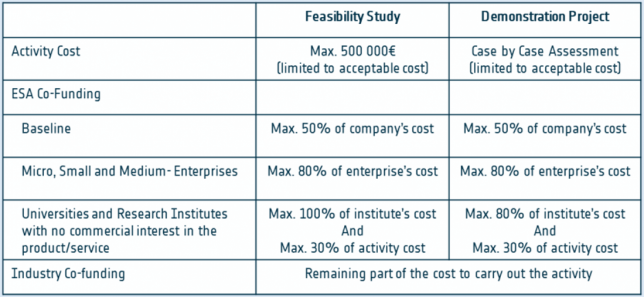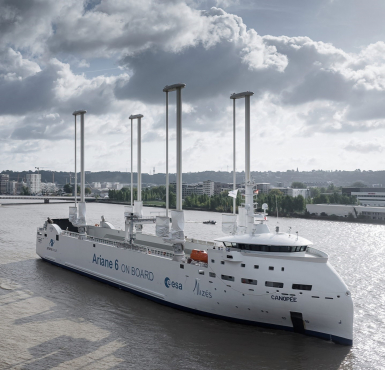FUNDING OPPORTUNITY
Maritime decarbonisation is a central element of maritime sustainability. Shipping is recognised as the most efficient form of commercial transport in terms of CO2 emissions per tonne of cargo transported in one mile. However, due to the scale of the industry, maritime transport is still a significant contributor to the world’s total greenhouse gas emissions (around 3% of total global CO2 emissions).
In recent years, there have been significant efforts to enhance fuel efficiency on various fronts, such route optimisation or hull and propeller design. However, achieving net-zero goals requires a profound transformation of the sector, where space assets are poised to play an integral role. This transformation is not only prompted by societal and economic pressures, but it is also underpinned by the release of several long-awaited regulatory frameworks from European and International maritime authorities.
This call for proposals, issued under the ARTES BASS programme line, is aimed at supporting the development of sustainable space-based services and applications that address challenges related to the decarbonisation of the maritime industry. Additionally, the call seeks to assist the maritime sector in adapting to and complying with new European and international regulatory frameworks.
SUB-THEMES
Maritime decarbonisation is a broad subject that requires the involvement and advancements from various stakeholders. To mirror the multifaceted nature of the required transformations and address the specific needs of different decarbonisation approaches, the Call has been organised into four sub-themes, each open at a different point in time. Please see the list of currently open or upcoming funding calls and their further specific details below:
Sub-theme 1: Decarbonisation through Digitalisation and Logistics Optimisation (opening: June 2024)
Sub-theme 2: Decarbonisation through Maritime Autonomy (opening: September 2024)
Sub-theme 3: Ports Decarbonisation (opening: November 2024)
Sub-theme 4: Green Propulsion (opening: January 2025)
ABOUT THE OPPORTUNITY
As part of this Call for Proposals, ESA will support Feasibility Studies and Demonstration Projects under this ‘Announcement of Opportunities’ as a 'Thematic for Proposals':
- Feasibility Studies allow successful teams to analyse, design and plan their intended service.
- Demonstration Projects allow successful teams to put their intended service into practice. Teams will test their service in the market by running a pilot with significant users and, by the end of the project, the service should be operational.
VALUE OF SPACE
Satellite technologies and data have a significant role to play within the proposed services:
- Satellite Positioning and timing: SOLAS Regulation V/19.2.1.6 requires all ships - irrespective of size - to have a receiver for a global navigation satellite system. Most logistics and digitalisation services rely on ships’ GNSS as the sole positioning data input. Additionally, GNSS reflectometry can be used to derive sea state for smart routing solutions, and advanced GNSS (e.g. RTK) may be used for high accuracy applications such as autonomous systems.
- Satellite Communications: Satellite connectivity is central to maritime decarbonisation and autonomous shipping. Satellite communications allow ubiquitous real-time connectivity securing a ship-to-shore channel and underpinning data analytics applications. In addition to generic VSAT, IoT, and LEO mega-constellation connectivity solutions, satellites also deliver maritime specific services such as the GMDSS, and satellite AIS, and VDES.
- Satellite Earth Observation: SatEO is routinely used to improve situational awareness on maritime operations including sea state, weather conditions, or hazards such as the presence of ice, which will be used as actionable input for maritime decarbonisation. SatEO is also used to assess the environmental impact of ships and ports, as well as to monitor fuel supply chain.
HOW TO APPLY
Once the respective sub-themes are open to proposal submission (opening dates are noted above) details and associated documentation related to the calls for proposals will be made available, including how to apply.
AUTHORISATION OF FUNDING
For this call, companies residing in the following Member States will be eligible to apply: Austria, Belgium, Czech Republic, Denmark, Estonia, Finland, France, Germany, Hungary, Ireland, Italy, Lithuania, Luxembourg, the Netherlands, Norway, Poland, Portugal, Romania, Spain, Sweden, Switzerland and the United Kingdom.
FUNDING SCHEME
Funded participation is open to any company and/or organisation, be it as a group of users, public body or non-governmental organisation, residing in any of the ESA Member States that are participating to the programme as specified in the Letter of Invitation in esa-star.
The applicable funding level of the individual prime- or subcontractors is subject to authorisation by the involved National Delegation(s). Therefore, bidding teams are requested to obtain a Letter of Authorisation from all their national delegations before submitting a Full Proposal.
The funding level is summarised in the table below:




